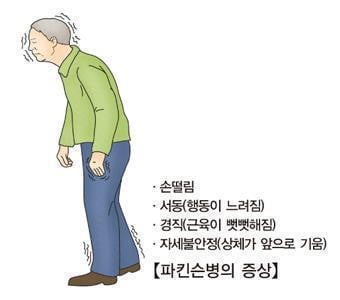Parkinson’s disease, the three major senile brain diseases, can be fully managed in daily life
Parkinson’s disease, along with dementia, is one of the most feared diseases of the elderly.
It is true that it is difficult to cure it, but it is better to give up hope because it is more effective than other brain diseases, so that if you manage it well, you can maintain your daily life.
On the occasion of World Parkinson’s Day (April 11), we investigated the misunderstandings and truths about Parkinson’s disease, which mainly occurs in the elderly.
◇ Parkinson’s disease, dementia, stroke, along with the three major senile brain diseases
According to the medical community, Parkinson’s disease is a degenerative nervous system disease that occurs when various neurons such as dopamine present in the midbrain of the brain slowly die.
It is counted as one of the three major senile brain diseases along with dementia and stroke.
In 1817, the British doctor Jameson Parkinson was known to the world when he reported to academia about the symptoms of a patient whose movement was slow due to trembling hands.
In commemoration of his achievements, his birthday, April 11, was designated as World Parkinson’s Day.
Parkinson’s disease, which mainly occurs in the elderly, has more than 120,000 patients in Korea alone as of 2019.
As the population aging accelerates, more than 20,000 Parkinson’s patients have increased in just four years compared to 2015.
Until now, a cure method has not been developed, so it is a disease that must be managed for a lifetime, but the response to the drug is good.
Dopaminergic drugs, which supplement dopamine in Parkinson’s disease patients with drugs, have excellent therapeutic effects.
A lack of dopamine can lead to impairments and side effects in the functioning of the connections, including the brain motor circuits, and taking the drug consistently can help alleviate symptoms of Parkinson’s disease.

◇ Characteristic of trembling in a stable posture
The main symptoms of Parkinson’s disease patients are tremors, stiffness, gait problems, and postural instability.
In particular, tremor is considered a representative symptom. In Parkinson’s disease patients, tremors tend to appear only when they are in a stable posture.
For example, one hand trembles while sitting on the sofa and watching television.
This is a distinctive point from other brain diseases in which hand tremor occurs when certain movements are performed, and when the person is still, the tremor becomes less frequent.
However, tremors can be caused not only by Parkinson’s disease but also by other diseases, so expert diagnosis is required.
Sleep disturbance and mild cognitive impairment are also one of the main symptoms of Parkinson’s disease.
People with Parkinson’s disease often dream a lot and talk about their dreams as real actions.
Normal people lose muscle tone during REM sleep and do not act even if they dream, but Parkinson’s disease patients scream, talk, or useless during REM sleep while maintaining some degree of muscle tone during REM sleep.
◇ Is it good to take the medicine late? Doesn’t work after 5 years?
Parkinson’s disease is difficult to cure, and patients have to take medicine for a lifetime, so patients are often confused about when to take it.
However, experts advise that drugs that supplement dopamine in the brain of people with Parkinson’s disease do not have to be reluctant to take it because it has an excellent effect on improving the symptoms of Parkinson’s disease.
In particular, online communities and clubs advised not to blindly believe in unfounded stories, such as taking the drug for Parkinson’s disease as late as possible or that it will not work 5 years after taking the drug.
Professor Jeong Seon-ju of neurology at Seoul Asan Hospital said, “There are patients who are reluctant to take drugs and rely on exercise after reading the articles posted on the Internet. “It’s not desirable.”
He said, “It is also misleading that the effect will disappear after 5 years of taking the Parkinson’s disease treatment,” he said. “Each patient may experience complications such as exhaustion of the drug and dyskinesia at different times. He added that there is no need to be afraid in advance because it can improve with surgery.”
◇ Maintain daily life by taking medicines, nutritional management and exercise for 1 hour before meal
The opinion of the medical community is that Parkinson’s disease has an excellent drug treatment effect compared to other brain diseases.
Drugs that completely solve complications after taking the drug for a long time are under research, but drugs that are available now can have a great effect in improving symptoms.
Instead, levodopa, commonly used as a treatment for Parkinson’s disease, should be taken 1 hour before meals.
Since levodopa is absorbed while competing with protein, care should be taken as the protein may reduce the efficacy of levodopa.
For Parkinson’s disease patients who do not have fatigue and energy, they should consume green vegetables, nuts, and an appropriate amount of protein, and continue to do aerobic exercise such as walking, strength exercise, and stretching.
Professor Jeong said, “Since a cure has not yet been developed, once you have Parkinson’s disease, it will be a lifelong journey.” It can be said that it is an enemy disease,” he advised.
/yunhap news
